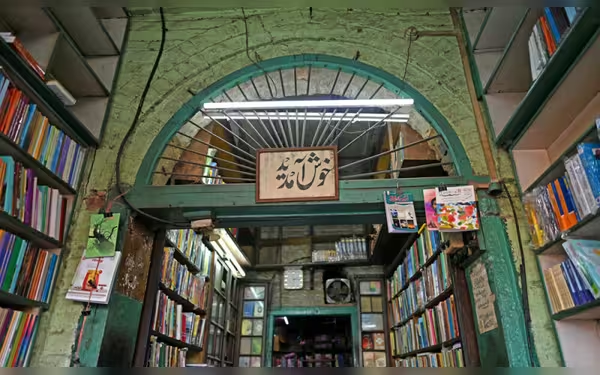Saturday, November 16, 2024 11:41 PM
Urdu Bazaar's Decline: A Cultural Heritage at Risk in Delhi
- Urdu Bazaar faces decline with many bookstores closing.
- Cultural shifts threaten the Urdu language's presence.
- Young generation shows renewed interest in Urdu literature.
 Image Credits: brecorder
Image Credits: brecorderThe Urdu Bazaar in Delhi faces decline, reflecting cultural shifts and challenges for Urdu literature, yet a revival among youth offers hope.
In the vibrant and historical area of Old Delhi, the Urdu Bazaar stands as a testament to the rich literary heritage of the Urdu language. Once a bustling hub for book lovers and scholars, this marketplace is now facing a decline, with many bookstores shuttering their doors. The Urdu language, cherished by poets and writers for centuries, is struggling to maintain its presence in a society increasingly dominated by Hindi. This situation reflects broader cultural shifts and challenges that the Urdu-speaking community faces in India.
Mohammed Mahfooz Alam, a 52-year-old bookseller, embodies the sorrow of this fading literary scene. He recalls a time when his store would see the publication of over 100 new books each year. "There was a time when, in a year, we would see 100 books being published," he reminisces, highlighting the stark contrast to the current state of affairs. The narrow streets of Urdu Bazaar, once alive with discussions about literature, are now filled with the enticing aroma of kebabs from restaurants that have taken the place of bookstores.
Urdu, one of the 22 languages recognized by the Indian constitution, is the mother tongue of approximately 50 million people in India. Despite its widespread understanding among Hindi speakers, the language faces misconceptions that label it as foreign or solely associated with the Muslim community. Alam passionately defends Urdu, stating, "Urdu has been associated with Muslims, and that has hit the language too. But it is not true. Everyone speaks Urdu. You go to villages, people speak Urdu. It is a very sweet language. There is peace in it." This sentiment underscores the need for a broader appreciation of Urdu as a cultural treasure that transcends religious boundaries.
The decline of Urdu literature can be attributed to several factors, including the rise of fast-food establishments in the area and the increasing reliance on digital media. Sikander Mirza Changezi, who co-founded a library to promote Urdu literature, notes, "With the advent of the internet, everything became easily available on the mobile phone. People started thinking buying books is useless, and this hit the income of booksellers and publishers, and they switched to other businesses." This shift has not only affected the livelihood of booksellers but has also diminished the cultural landscape of the Urdu-speaking community.
Despite these challenges, there are glimmers of hope. The Hazrat Shah Waliullah Public Library, established by Changezi, houses thousands of books, including rare manuscripts and dictionaries. Student Adeeba Tanveer, who holds a master's degree in Urdu, expresses optimism about the future of the language. "The love for Urdu is slowly coming back," she shares, noting that even her non-Muslim friends are eager to learn. "It is such a beautiful language. You feel the beauty when you speak it." This resurgence of interest among younger generations may pave the way for a revival of Urdu literature.
As the Urdu Bazaar grapples with its identity in a rapidly changing world, it serves as a reminder of the importance of preserving cultural heritage. The decline of Urdu literature is not just a loss for the Urdu-speaking community but for the entire tapestry of Indian culture. Encouraging a renewed appreciation for Urdu can foster understanding and unity among diverse communities, ensuring that this beautiful language continues to thrive for generations to come.













